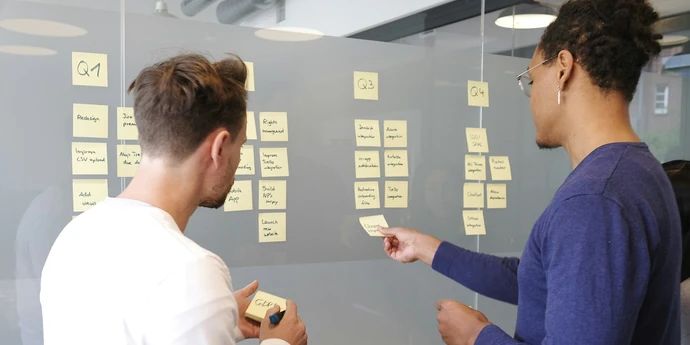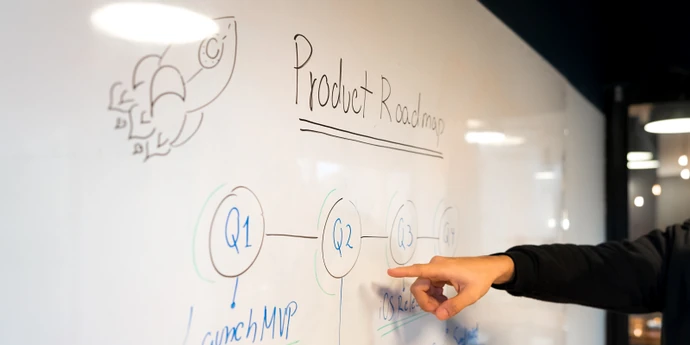If you’re preparing for Meta product manager interviews, the leadership and drive interview is one of the three types of interviews you’re going to need to crack. It will consist of mainly behavioral questions that seek to test your soft skills as well as your motivation for the role.
Many candidates assume that the leadership and drive interview will be easier than the product sense and analytical thinking interviews. But don't treat it lightly: Meta wants to hire leaders, and if you fail to demonstrate that you are one, or at least can become one, you won't get an offer.
To help you, we’ve created this guide to give you everything you need to know to prepare for the Meta leadership and drive interview, including example questions, and tips on how to answer.
- About the Meta leadership and drive interview for PMs
- Example questions
- How to answer
- Meta PM interview grading rubrics
- How to practice
Ready? Let's go.
Click here to practice with Meta PM ex-interviewers
1. What is the Meta leadership and drive interview?
The Meta leadership and drive interview is one of three types of interviews you’ll face if you’re applying for a product manager role at Meta. The others are the “analytical thinking/execution interview” and the “product sense interview”. However, unlike those two, the leadership and drive interview is conducted at the full loop stage only.
(Click here to read our full guide to the Meta product manager interview)
Meta's leadership and drive interview consists of four or five behavioral questions that focus on the following areas:
- Drive and motivation to work at Meta
- Leading a team and managing conflict
- Driving results
- Seeking opportunities to grow and learn
- Working with others
As the list suggests, you can expect one of the questions to test your motivations for the role (e.g "Why Meta?"), but most will be behavioral questions that require a specific example from your past experience: "Tell me about a time you solved a problem", etc.
You should aim to give answers that are concise but detailed. Be ready for the interviewer to dive into certain aspects of your answer with probing follow-up questions.
"Aim to give answers that are 4-5 minutes in length. Your focus should be on articulating the problem, explaining why it was important to solve it, and what was at stake. And then, what were the results? As you conclude, reflect on what you and the team learned and improved on from those experiences." Astika, ex-Meta senior product manager.
We'll talk more about how to answer leadership and drive questions in section 3, but first let's see some examples asked in recent Meta interviews.
2. Meta Leadership and Drive example questions ↑
We’ve analyzed hundreds of reports from Meta PM candidates on Glassdoor to find real questions asked in Meta leadership and drive interviews for product managers.
We categorized them using some of the topics Meta refers to in its official Meta PM full loop interview guide. There is some overlap, but categorizing them in this way should make your preparation a little easier.
Let’s take a look.
2.1 Drive and motivation
Meta wants to hire candidates who are highly motivated to make an impact. Expect to be asked about your motivation to work in product management, and why you want to work at Meta.
Be ready for this type of question at any stage of the process, from recruiter call onward. You'll want to have prepared answers that are structured, concise, and compelling.
Example questions:
- Tell me about yourself (video solution)
- Why Meta? (video solution, written guide)
- Why product management?
- What's your biggest accomplishment?
- What is your biggest motivation?
2.2 Leading a team and managing conflict
Of course, a key part of a product manager's role is people management skills to manage and motivate their team. Meta puts a strong emphasis on conflict resolution, so come prepared with a couple of strong stories that show how you managed conflict effectively and with empathy.
Example questions:
- How do you earn the trust of your team?
- Tell me about a time you led a team
- How do you deal with a disgruntled team member?
- Tell me about a time you dealt with a conflict in a team
- What was a time you had to resolve conflict between teams?
- Tell me about a team that was hard to work with
- Tell me about a time you disagreed with a manager
- How would you give critical feedback to your manager?
- Tell me about a time you’ve worked with someone difficult
For further reading, see our guide to answering people management questions in tech interviews
2.3 Driving results
A great product manager doesn’t just execute—they take initiative, push forward in uncertainty, and ensure their team is always moving in the right direction. At Meta, they look for PMs who can balance multiple priorities, navigate ambiguity, and drive meaningful outcomes.
Our ex-Meta PMs tell us that things get done very quickly at Meta (faster than at Google, for example) so show too that you're comfortable working in an environment that prioritizes done over perfect.
Example questions
- Tell me about a time you had to prioritize numerous different projects and priorities
- Tell me about a time when you had to operate under uncertainty
- How do you measure the success of your roadmap?
- How many projects are you used to managing at one time?
- Describe an unexpected challenge that arose during a project and how you dealt with it
For some help on how to talk about processes and project management in tech interviews, you might find our program management primer to be useful reading.
2.4 Seeking opportunities to grow and learn
Meta values product managers who are constantly evolving—those who embrace failures as learning opportunities, seek out feedback, and actively work to improve their skills. They want to see you "exhibit introspection and self-awareness in terms of self-growth....and be open about your mistakes and talk through examples of what you’ve learned from them."
Be prepared to share examples of times you faced setbacks, identified areas for improvement, and took action to level up.
Example questions:
- Tell me about a time you failed at work
- Tell me about a project that did not go as planned
- What is your biggest weakness?
- Tell me about a time when you realized you lacked a key skill and worked to acquire it
- Tell me about a time when you’ve received difficult feedback
- What are the two most important attributes in a product manager?
2.5 Working with others
Of course, product managers don’t work in isolation—success depends on collaboration across teams, functions, and stakeholders. At Meta, they look for PMs who can communicate effectively, build strong relationships, navigate complex team dynamics, and ensure alignment across different groups.
"As well as requiring strong communication skills at all levels, Meta puts a lot of value on candidates who can demonstrate strong relationship-building skills, not just in their immediate team but also with partners and cross-functional leaders" says Astika, ex-Meta senior product manager.
With that in mind, be sure to prepare some stories that demonstrate you working with stakeholders from other teams and areas in order to solve difficult problems and describe how you build and nurture those kinds of relationships.
Example questions:
- Tell me about a time you worked cross-functionally
- How do you identify stakeholders?
- How do you manage communication with different stakeholders?
- Tell me about a time you solved an ambiguous business issue and connected different teams?
3. How to answer Meta leadership and drive interview questions ↑
The four or five questions you'll face in a Meta leadership and drive interview will be behavioral questions - that's to say, they test your past behavior as a way of predicting your future behavior.
Structuring your answers is important (and expected) when answering behavioral questions. The STAR method (Situation, Task, Action, Result) is the most commonly used approach because it’s easy to remember.
However, we’ve found that candidates often find it difficult to distinguish the difference between steps two and three, or task and action. Some also forget to include lessons learned in the results step, which is especially crucial when discussing past failures.
So we’ve developed the IGotAnOffer method to correct some of the pitfalls we’ve observed when using the STAR method. We call it the (admittedly, not as catchy) SPSIL method.
3.1 The SPSIL method
Let’s step through our suggested five-step approach:
- Situation: Start by giving the necessary context of the situation you were in. Describe your role, the team, the organization, the market, etc. You should only give the minimum context needed to understand the problem and the solution in your story. Nothing more.
- Problem: Outline the problem you and your team were facing.
- Solution: Explain the solution you came up with to solve the problem. Step through how you went about implementing your solution, and focus on your contribution over what the team / larger organization did.
- Impact: Summarize the positive results you achieved for your team, department, and organization. As much as possible, quantify the impact.
- Lessons: Conclude with any lessons you might have learned in the process.
You’ll notice that this method covers very similar themes to the STAR method. We like it because a lot of the candidates we work with find this framework easier to use, as there’s no overlap between any of the steps in your story.
For a deeper dive into this topic, check out our article on why the STAR method isn’t always the best for PM interviews and how IGotAnOffer's SPSIL method can be a better option.
You should practice using whatever method you’re the most comfortable with.
If you want to get a better idea of how our method works, work through the example below.
3.2 Example answer
Now that you know some approaches to answering behavioral questions, let's look at a full example. We’ll use a question that's typical at Meta: "Tell me about a time you dealt with a group conflict".
(Note that since this is just an example for you to understand the structure, we've made it brief. In your answers, you might want to go into 20-30% more detail. Remember, aim for 4-5 minutes total.)
Example answer:
(Situation)
Certainly. In my previous role, I found myself in the midst of a conflict regarding resource allocation for two critical projects within our development team.
(Problem)
The conflict arose when both the product development and infrastructure enhancement teams were vying for the same limited resources for their respective projects. I could empathize with both their perspectives but it seemed to me that many of the people involved were basing their arguments on their "gut feeling" around what was "fair".
(Solution)
Recognizing the potential disruption this conflict could cause, I organized a collaborative discussion involving representatives from both teams, project managers, and the leadership. During this discussion, we openly addressed the conflicting priorities and resource needs of each project. I encouraged a transparent sharing of data and information regarding the potential impact of both projects on the company's goals.
This way we were able to base our discussion around the data, rather than around people's subjective opinions and hunches.
(Impact)
By presenting a data-driven analysis and illustrating how each project aligned with the company's objectives, we were able to justify the resource allocation for both initiatives. The infrastructure team ended up with slightly less than they were hoping for, but presented with the data, they accepted that this was a fair distribution of resources. In the end, both projects progressed effectively.
(Lessons)
Ultimately, this experience taught me how useful data can be in solving or avoiding these types of conflicts. When people are using opinions, hunches, and emotions to make decisions, disagreements occur and they tend to feel more personal. But when the decision-making process is data-driven there is less room for subjective opinion and it becomes easier to align different stakeholders."
4. Meta Product Interview Grading Rubrics ↑
At Meta, your performance is evaluated after EACH interview using a standardized product interview grading rubric. Noah, an ex-Meta product leader, shares a sneak peek of how Meta runs this process.
Interview format
A standard PM loop at Meta consists of five interviews:
- The first round includes one Product Sense and one Analytical Thinking interview
- If a candidate passes both, they move on to a repeat of round one (Product Sense round 2 and Analytical Thinking round 2), plus a Leadership and Drive interview
Learn more about these question types in Meta’s official PM interview loop guide.
Typically, within about 24 hours of each interview, the interviewer submits their feedback in Meta’s interview system. Note that there is no formal debrief after the loop, so interviewers cannot see what others have submitted until they submit their own feedback.
For each grading criterion, interviewers assign one of the following scores and include written feedback explaining their rating:
- Below Expectations
- Meets Expectations
- Strong
- Exceptional
- Unable to evaluate
Example evaluation criteria
FAANG companies, including Meta, are very secretive about the exact details of their interview grading rubrics. Below is an example set of evaluation criteria for Product Sense and Analytical Thinking (Product Execution) that Noah recommends PM candidates use to guide their prep.
You can use this sample rubric to identify potential gaps in your approach and improve your answers before the actual interviews.
Note that these are NOT Meta’s actual interview rubric, but a representative example based on Meta’s PM interview loop guide.
Product Sense
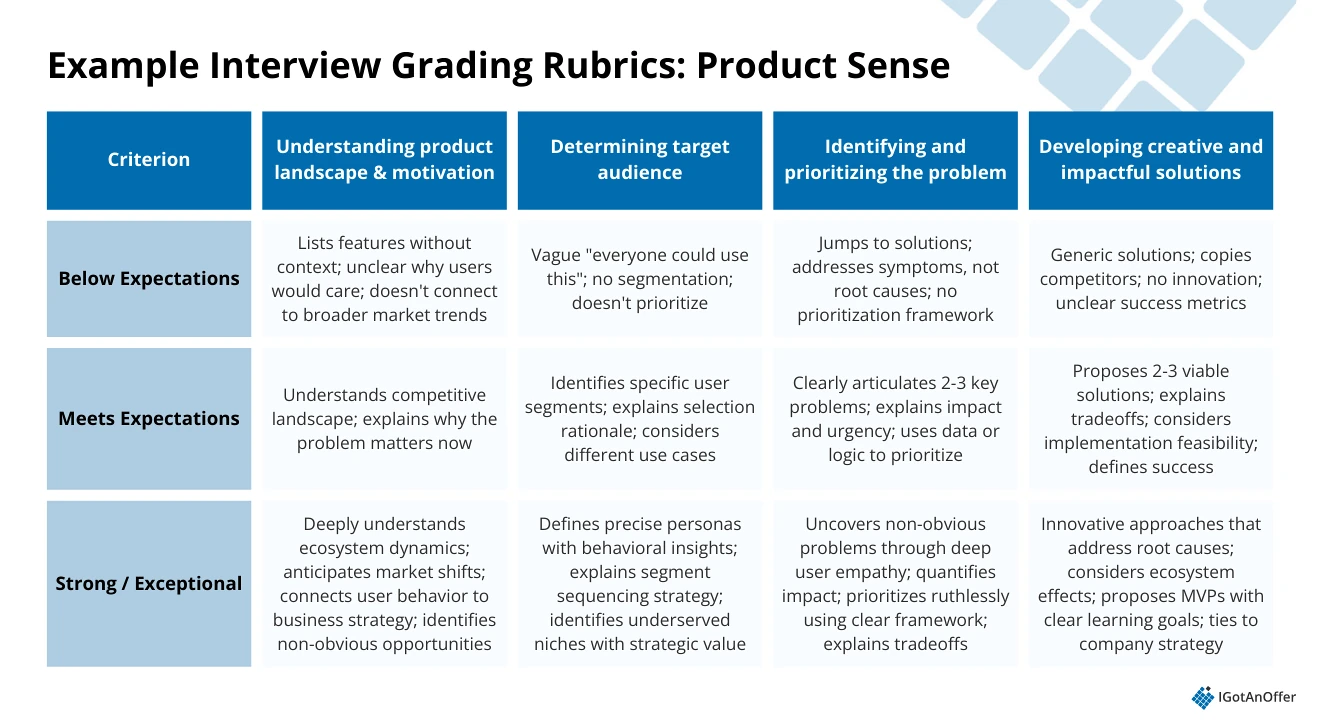
Analytical Thinking / Product Execution
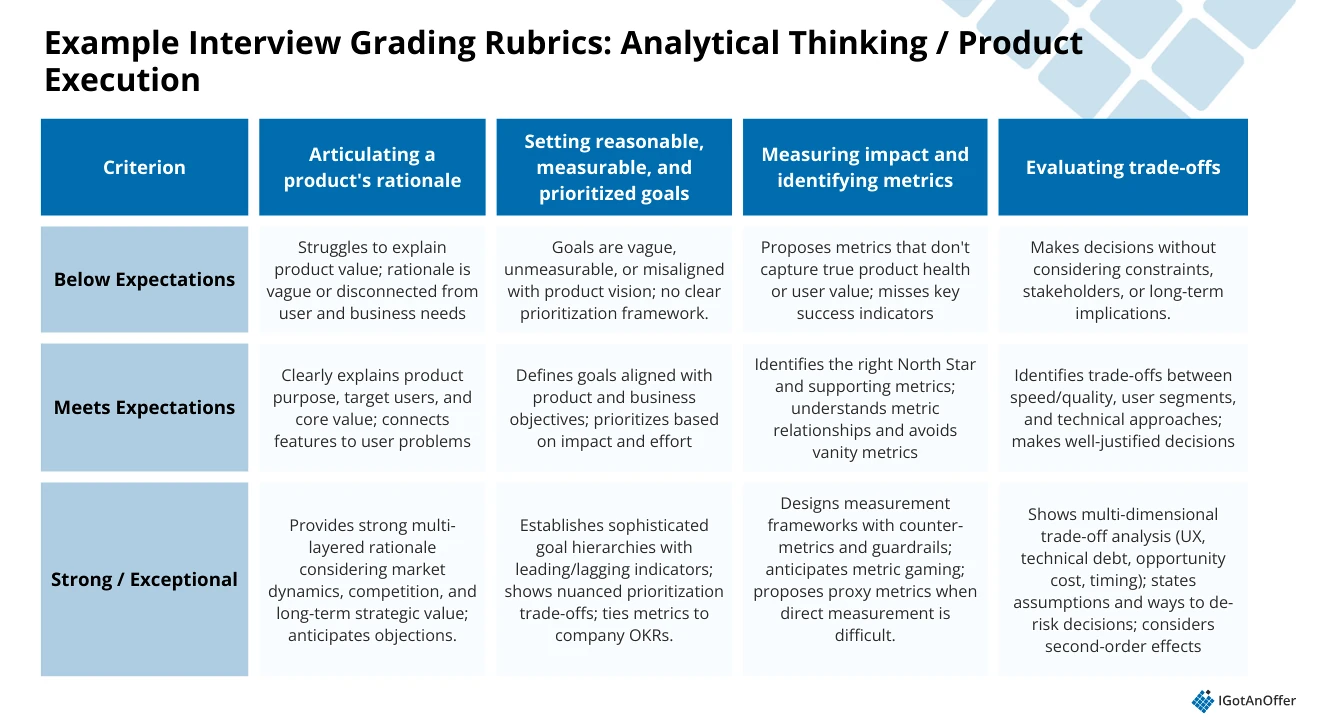
Click here to download the example PM interview grading rubrics (PDF)
In addition to the scores, interviewers also submit a summary note, such as “Soft no,” “Suggest re-evaluate,” or “Strong yes,” which can significantly influence the hiring decision.
Post-evaluation
Once all evaluations have been submitted, there are three possible outcomes:
- You move forward for approval if most interviewers recommend “Hire” or “Strong Hire”
- You may be asked to complete follow-up interviews if feedback is mixed or additional information is needed
- You are rejected if there are multiple “No hire” or “Strong no hire” recommendations
After the post-evaluation stage, candidates who pass the hiring committee move on to leveling and team matching.
5. How to practice Meta leadership and drive interviews ↑
We've coached more than 15,000 people for interviews since 2018. There are essentially three activities you can do to practice for interviews. Here’s what we've learned about each of them.
5.1 Learn by yourself
Learning by yourself is an essential first step. We highly recommend reading our other content around Meta PM interviews. Start with our main Meta product manager interview guide and jump into the many relevant, free resources it lists.
We also recommend that you watch some mock interviews (including behavioral) on our product management YouTube channel. That way you can see what an excellent answer looks like.
In addition, we’ve put together interview fact sheets that you can use during your prep. These provide a general understanding of Meta’s products and user base, areas interviewers often expect candidates to reference during interviews.
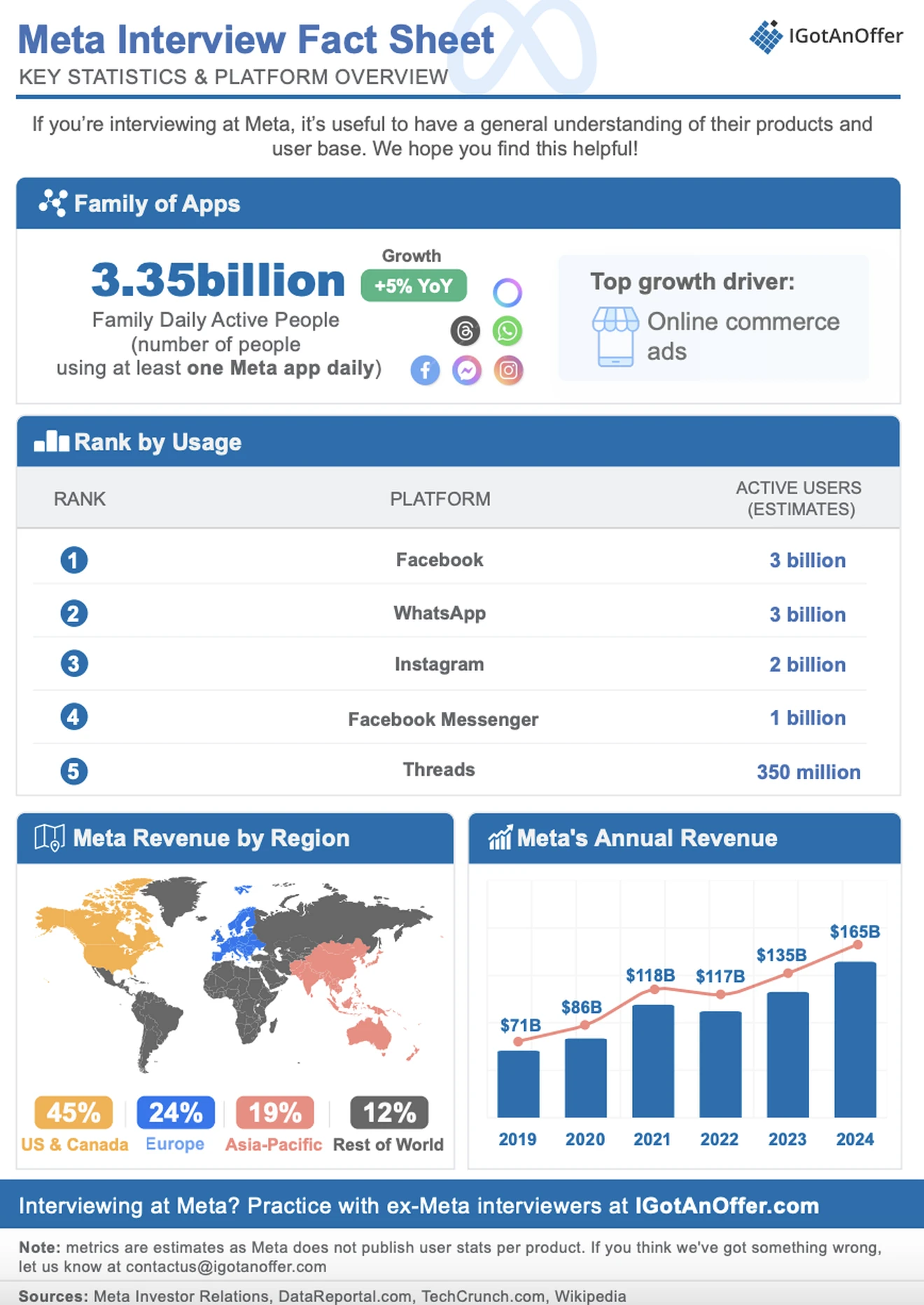
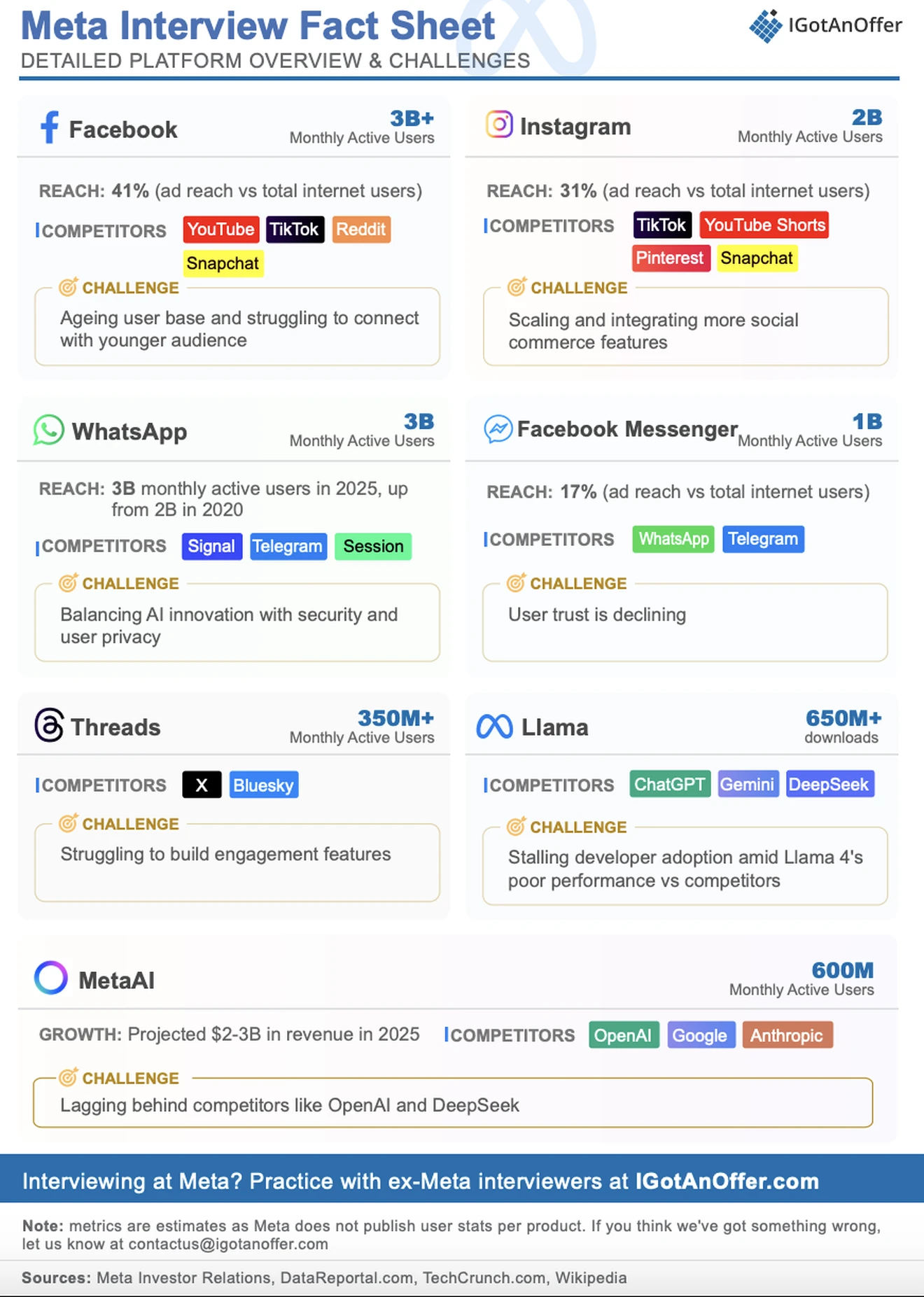
Click here to download the Meta interview fact sheets
Once you’re in command of the subject matter, you’ll want to practice answering questions. But by yourself, you can’t simulate thinking on your feet or the pressure of performing in front of a stranger. Plus, there are no unexpected follow-up questions and no feedback.
That’s why many candidates try to practice with friends or peers.
Already interviewed for your role and wondering how to deal with a possible rejection from Meta? Check out our Meta interview rejection guide.
5.2 Practice with peers
If you have friends or peers who can do mock interviews with you, that's an option worth trying. It’s free, but be warned, you may come up against the following problems:
- It’s hard to know if the feedback you get is accurate
- They’re unlikely to have insider knowledge of interviews at your target company
- On peer platforms, people often waste your time by not showing up
For those reasons, many candidates skip peer mock interviews and go straight to mock interviews with an expert.
5.3 Practice with experienced PM interviewers
In our experience, practicing real interviews with experts who can give you company-specific feedback makes a huge difference.
Find a Meta product manager interview coach so you can:
- Test yourself under real interview conditions
- Get accurate feedback from a real expert
- Build your confidence
- Get company-specific insights
- Learn how to tell the right stories, better.
- Save time by focusing your preparation
Landing a job at a big tech company often results in a $50,000 per year or more increase in total compensation. In our experience, three or four coaching sessions worth ~$500 make a significant difference in your ability to land the job. That’s an ROI of 100x!







